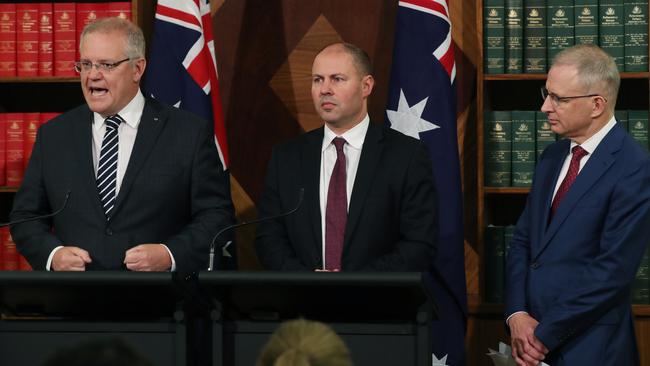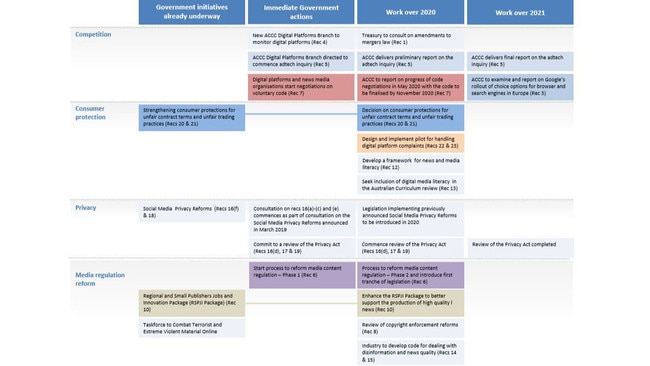Morrison Government release response to ACCC report into digital platforms
The Coalition reveals its plans to address the market power of technology giants Google and Facebook.

The Morrison Government has given technology giants Google and Facebook the chance to work with media companies on a voluntary code of conduct to oversee commercial arrangements, in an attempt to level the playing field between traditional and new media.
Prime Minister Scott Morrison and Treasurer Josh Frydenberg have pledged that if a voluntary code between the companies is not introduced, they will seek to mandate one by November 2020.
On Thursday Mr Frydenberg, Attorney-General Christian Porter and Communications Minister Paul Fletcher revealed the government’s plans to address the market power of the digital platforms, including a $26.9 million investment over four years in a special unit within the Australian Competition and Consumer Commission to monitor and report on competition issues, reforms to media regulation and a review of the Privacy Act.
The establishment of a code of conduct, which would govern commercial arrangements and algorithm changes between digital platforms and news media businesses, will also be established. The ACCC will deliver a report to government on the progress of negotiations between the technology platforms and media companies in May, with the code to be finalised by November.
The creation of the code will be overseen by the ACCC, who will assess the adequacy of the platform’s measures and report back to government. If there is no agreement, the government will look at other options, including the creation of a mandatory code.
“The companies are on notice. The government is not messing around,” Mr Frydenberg said
The government’s response comes six months after the ACCC report was first released.
READ MORE: Leo Shanahan — Tech titans won’t be shaking in their boots | John Durie — Delay, as giants march on | Media chiefs welcome digital reform | Solid year for competition watchdog, but still more to do | Google and Facebook want to rule your world | FreeTV backs ACCC digital crackdown | Mark Ritson — Dark days ahead for traditional media
“The reforms agreed to by the Government and outlined in our Implementation Roadmap will strengthen competition and consumer protection and improve the sustainability of the Australian media landscape,” said a joint statement from Mr Frydenberg, Mr Porter and Mr Fletcher said.
“The Government’s role is not to protect domestic businesses from digital competition, but rather to ensure the proper functioning of markets and a fair approach to regulation that ensures the rules of the physical world apply equally to the digital world.”

The ACCC report was first released on July 26 and featured 23 recommendations on issues including privacy, data protection and media regulation. It was described by Mr Frydenberg at the time as a “world first” report that looked at the significant market power of search engines and social media platforms.
On Thursday Mr Morrison said he wanted Australia to be the world’s “model jurisdiction” for handling digital platforms. He said the government was focused on building the capability of the ACCC to be a “world leader”.
“I want us to be the model jurisdiction in the world for how we are dealing with digital platforms, social media platforms,” Mr Morrison said. “The rules that exist in the real world need to exist in the digital world.”
Mr Frydenberg said he wanted Australia to stay “ahead of the game”.
“What we are seeking to do here … is not only minimise the harm, but to maximise the opportunities for all Australians and for the economy as a whole,” he said.
In its 19-page response, the government said it supported or supported “in principle’’ 15 of the 23 recommendations proposed by the ACCC in July. Two of the recommendations were not supported.
In addition to the code of conduct, the government will immediately establish a unit with the ACCC to monitor and report on competition and consumer protection. The unit will be able to take action and conduct inquiries as directed by the Treasurer, the first of which will be into the supply of online advertising and ad-tech services.
As it looks to strengthen privacy laws, the government will develop legislation for public consultation on increasing penalties under the Privacy Act and the creation of an online privacy code.
The government will look at establishing harmonised regulation across traditional and new forms of media. As part of this, the government will look at content obligations for free to air television broadcasters and whether there should be obligations for Australian content on subscription video-on-demand services.
Further public consultation on merger law is needed, the government said. In relation to the recommendation about changes to search engine and interest browser results, the government said it would wait until the ACCC monitored and reported back on Google’s rollout of options in Europe.
The government will also improve the regional and small publishers jobs and innovation package to support creation of news, particularly in regional areas.
However it did not support proposals tax offsets to encourage philanthropic support of journalism or for a mandatory ACMA take-down code to assist with copyright enforcement of digital platforms.
Labor’s communications spokeswoman Michelle Rowland declared the Coalition’s response to the ACCC inquiry showed it “still doesn’t get it when it comes to public interest journalism, particularly in regional areas, which was the core impetus of this inquiry in the first place”.
She hit out at the government supporting the ACCC’s recommendation of stable and adequate funding for the public broadcasters when the ABC was dealing with an $83.7m budget shortfall.
In a joint statement with treasury spokesman Jim Chalmers, legal affairs spokesman Mark Dreyfus and innovation, technology and future of the work spokeswoman Clare O’Neil, Ms Rowland said Labor supported the establishment of an ACCC digital platforms unit and a commitment to deliver a platform-neutral regulatory framework covering both online and offline delivery of content.
The Labor frontbenchers claimed the government had adopted their party’s policy of consulting on options to inform the policy and regulatory framework for Australian and children’s screen content.
“Much of the work the government says they’re going to do now could and should have been done years ago and Australia faces 2020 with a backlog of policy work that has piled up under the Liberals and Nationals,” the Labor MPs said.
“This government’s heart was never in the reform agenda or the digital platforms inquiry.”
Formed after an 18-month inquiry, the ACCC report found that technology platforms has distorted the ability of businesses to compete on merits in advertising, media and other markets, that consumers were not adequately informed about how data was collected and used, and that disinformation was linked to their behaviour.
ACCC chairman Rod Sims said the issues raised in the inquiry were “too important” to be left to the companies themselves. He also revealed the regulator had launched five separate investigations into the technology giants as a result of the inquiry.
The ACCC has since sued Google for allegedly misleading Android users about the steps needed to disable its ability to track and use location data.
In the report, the ACCC recommended overhauling the way digital platforms operate, the ongoing monitoring of Google and Facebook’s prioritisation of news and advertising, and the way the platforms manage privacy.

The inquiry was welcomed by Australia’s biggest media companies including News Corp, publisher of The Australian and Nine Entertainment Co. Google and Facebook supported a number of recommendations, but Facebook and Google were wary about parts of the report.
In its response, Facebook said the regulator had misunderstood how digital platforms operate, objecting to any revenue sharing or data-sharing code of conduct with media organisations.
Mr Sims warned last month Australia would be left behind if the government did not give the watchdog fresh powers to block mergers and acquisitions involving tech titans.
On Thursday the ACCC welcomed the response.
“The ACCC has today welcomed the Australian Government’s commitment to adopting the key recommendations from its Digital Platforms Inquiry, which will help address the impact of digital platforms on Australian consumers, business and society,” a statement said.
“The Government’s immediate commitments and road map for reform address the ACCC’s main competition and consumer priorities, including concerns about privacy and the use of data.”
The ACCC inquiry was launched in December 2017 under pressure from then independent senator Nick Xenephon and was created to look at the impact digital platforms had on traditional media.



To join the conversation, please log in. Don't have an account? Register
Join the conversation, you are commenting as Logout